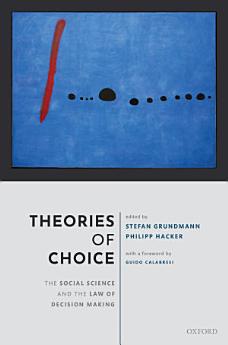Theories of Choice: The Social Science and the Law of Decision Making
Stefan Grundmann · Philipp Hacker
Jan 2021 · Oxford University Press
Ebook
320
Pages
family_home
Eligible
info
reportRatings and reviews aren’t verified Learn More
About this ebook
Choice is a key concept of our time. It is a foundational mechanism for every legal order in societies that are, politically, constituted as democracies and, economically, built on the market mechanism. Thus, choice can be understood as an atomic structure that grounds core societal processes. In recent years, however, the debate over the right way to theorize choice - for example, as a rational or a behavioral type of decision making - has intensified. This collection provides an in-depth discussion of the promises and perils of specific types of theories of choice. It shows how the selection of a specific theory of choice can make a difference for concrete legal questions, in particular in the regulation of the digital economy or in choosing between market, firm, or network. In its first part, the volume provides an accessible overview of the current debates about rational versus behavioral approaches to theories of choice. The remainder of the book structures the vast landscape of theories of choice along with three main types: individual, collective, and organizational decision making. As theories of choice proliferate and become ever more sophisticated, however, the process of choosing an adequate theory of choice becomes increasingly intricate. This volume addresses this selection problem for the various legal arenas in which individual, organizational, and collective decisions matter. By drawing on economic, technological, political, and legal points of view, the volume shows which theories of choice are at the disposal of the legally relevant decision-maker, and how they can be operationalized for the solution of concrete legal problems. The editors acknowledge the kind support of the Fritz Thyssen Foundation for an exploratory conference on the subject of the book.
About the author
Dr. Stefan Grundmann, LL.M. (Berkeley), is a Professor of Transnational Law and Theory at the European University Institute (Florence) and Professor of Private and Business Law at Humboldt University Berlin. His major publications in several languages include overall treatises on European Company Law, European Contract Law, Banking and Capital Market Law, New Private Law Theory, and a host of articles in these areas, including transnational and interdisciplinary governance issues. He is editor-in-chief of the European Review of Contract Law, the Ius Communitatis series of textbooks, and president of the Society of European Contract Law (SECOLA), of the European Law School (Berlin/London/Paris/Rome/Amsterdam), and of the Theory section of the German Association of Comparative Law. Dr. Philipp Hacker, LL.M. (Yale) is a Professor of Law and Ethics of the Digital Society at the European New School of Digital Studies, located at European University Viadrina, and a Research Fellow at the Centre for Law, Economics and Society and at the Centre for Blockchain Technologies, both at University College London. Previous positions included an AXA Postdoctoral Fellowship at Humboldt University Berlin, a Max Weber Fellowship at the European University Institute and an A.SK Fellowship at the WZB Berlin Social Science Center. His research focuses on behavioral law and economics as well as the interplay between emerging technologies and the law.
Rate this ebook
Tell us what you think.
Reading information
Smartphones and tablets
Install the Google Play Books app for Android and iPad/iPhone. It syncs automatically with your account and allows you to read online or offline wherever you are.
Laptops and computers
You can listen to audiobooks purchased on Google Play using your computer's web browser.
eReaders and other devices
To read on e-ink devices like Kobo eReaders, you'll need to download a file and transfer it to your device. Follow the detailed Help Center instructions to transfer the files to supported eReaders.







